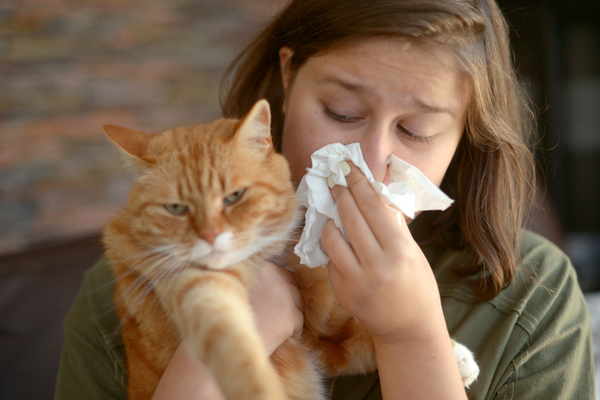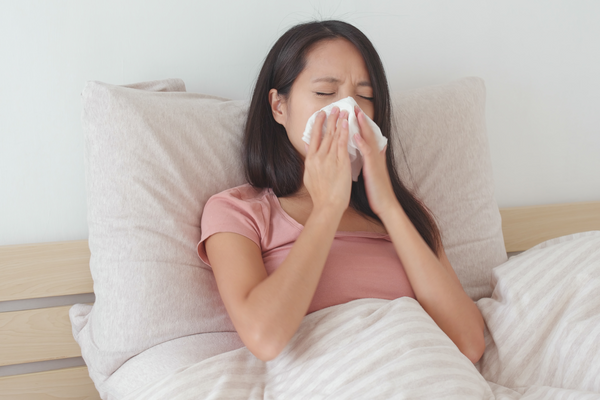Climate Change Could Be Making Your Allergies Worse

Have seasonal allergies? Brace yourself: New research shows that pollen season will get a lot longer and more intense with climate change. The study, published in the Nature Communications journal, found the U.S. could face up to a 200% increase in total pollen this century if the levels of carbon-dioxide emissions continue to rise at the current rate. Under that scenario, the spring pollen season will generally start up to 40 days earlier and last up to 19 days longer than it does today. What exactly is pollen? And how can allergy sufferers find relief from uncomfortable symptoms? We have the details for you here.
Airborne pollen has significant respiratory health impacts, especially for allergy sufferers and those with asthma. According to the Asthma and Allergy Foundation of America (AAFA), pollen is one of the most common triggers of seasonal allergies. A pollen allergy is commonly known as “hay fever.”
More than 24 million people in the U.S. experience pollen-induced respiratory allergies or hay fever, according to the Centers for Disease Control and Prevention (CDC). Researchers predict that a longer and earlier start to pollen season could trigger a public health emergency.
Numerous studies show that rising global temperatures have already worsened North American pollen seasons and that climate-driven pollen trends are likely to further exacerbate respiratory health impacts in the coming decades.
Related: What Is A Carbon Footprint?
What is Pollen?
Pollen is from the Latin word meaning “fine flour.” Pollen is often yellow, but it can also be red, orange, pink, purple, blue, green, white, and even black. Each grain of pollen is tiny. So tiny, in fact, that hundreds of them could fit inside the dot of this little i. Individual grains of pollen can only be seen clearly with magnification.
As small (and pesky) as pollen is, it is one of the most precious materials on our beautiful planet. Why, exactly? Well, while animals can roam, search for a mate, and reproduce, plants are rooted in place and need a different way to… mingle. Pollen contains the male genetic material for a plant’s reproduction. The movement of pollen must occur for plants to become fertilized and produce seeds, fruits, and young plants.
What is a Pollen Allergy?
Each spring, summer, and fall (and even in winter in warmer climates), plants release these tiny dry pollen grains to fertilize other plants of the same species; this is called pollination. The amount of pollen produced and released depends on how the plant grows. Some varieties of pollen can’t move on their own, so the process of pollination requires the assistance of pollinators like birds, bats, butterflies, moths, flies, beetles, wasps, small mammals, and most importantly, bees. Pollinators visit flowers to drink energy-rich nectar or feed off protein-rich pollen and transport pollen grains as they move from flower to flower.
The pollen of other plants is carried by the wind. Wind-carried pollen is dryer, lighter, and often much smaller than pollinator-carried pollen. This type of pollen is produced in massive quantities and can travel great distances, which increases the chances of it landing on a flower of its own species. Wind-carried pollen is what causes allergic reactions in people. When allergy sufferers breathe in pollen, their immune system treats it as an invader and produces chemicals to try and eliminate the threat, causing uncomfortable allergy symptoms. There are three main types of pollen allergies: tree pollen allergy, grass pollen allergy, and weed pollen allergy.
Wind-driven pollen is closely tied to changes in temperature and precipitation. So, as spring seasons get warmer earlier due to climate change, plants will pollinate much earlier and for a more extended period.
What Are the Common Symptoms of a Pollen Allergy?
Those with pollen allergies only have symptoms when the pollen they are allergic to is in the air. Some people are allergic to particular pollen, and others have more allergenic proteins that drive more allergies. Additionally, higher concentrations of pollen can exacerbate allergies.
Common symptoms of pollen allergy include:
- Sneezing
- Runny nose
- Itchy nose
- Nasal congestion
- Itchy throat
- Swelling around the eyes
- Itchy, red, watery eyes
Tips on How to Manage Your Seasonal Allergies
Thankfully, there’s a lot you can do to minimize the fallout from pollen. Here are some tips to help reduce or eliminate allergy symptoms:
Reduce Your Exposure to Allergens
- Use an app, like Pollen Wise, to check the current levels of pollen, mold, and dust in the air to help you decide when it’s best to spend time outside.
- If high pollen counts are forecasted in your area, consider taking allergy medications before your symptoms start.
- Keep your windows closed when pollen counts are high.
- If you have a dog, try to avoid walking them in the early morning or late afternoon when pollen levels are typically highest.
- After taking your dog to the park or walking in an area with high grasses or weeds, bathe them as soon as you get home to avoid spreading pollen around your home.
- Wear a mask when cutting the lawn, gardening, or other outside chores; a painter’s mask with a filter works well to keep out pollen.
- Avoid hanging laundry outside to dry when the pollen counts are high; pollen can easily cling to fabrics.
- Vacuum carpets, rugs, and upholstery frequently (at least once a week), using a vacuum with a high-efficiency particulate (HEPA) filter.
- Use a portable HEPA air purifier in the areas in your home where you spend the most time, such as your bedroom or home office.
- Don’t wear outside shoes inside of your home.
- Remove clothes you’ve worn outside and wash them with an Anti-Allergen Laundry Detergent.
- Consult your doctor or allergist to determine what’s causing your allergy or asthma symptoms; an allergy test will confirm what triggers your allergic symptoms.
Have questions about controlling common allergens? We have answers! The Ecology Works has been helping people with allergies and asthma since 1993. We can help you select the products you need to live a better, allergen-free life. Please feel free to Contact Us or message us on Facebook. No question is too small! We’re here to help.






